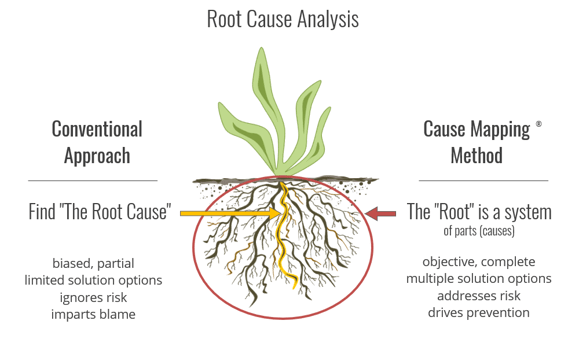No matter the size of your company, the industry you’re in, or the market segment you serve, every company faces problems. These issues can lead to incidents that cost the company in terms of time, money, reputation, or may even threaten to fold the company entirely. Using root cause analysis, companies can identify underlying causes of an adverse event to mitigate or reduce risks, or to help prevent a recurring problem.
The analogy of a weed is an effective way to think about root cause analysis as a problem-solving tool. Like the weeds in your garden, the garish and unruly above-ground growth is easy and obvious to spot. It’s the issue that is causing concern — and like real-life weeds — if only an immediate cause is addressed, like cutting off the growth above ground, the weed will generally come back.

If you’re facing recurring problems in your company and solutions implemented haven’t yielded improvement, root cause analysis can help you shine a light below the surface to reveal, not a single source for the problem, but a system of interconnected roots (causes) that all contributed to the incident.
This important distinction is where the analogy is often misrepresented and/or misinterpreted. Root cause analysis is not a magical quest to find the one key source of the problem to eliminate. That's not how effective problem-solving works and limited thinking could even harm your business by limiting your solutions.
The reality is that every problem has multiple causes, whether you choose to acknowledge them or not. A mental model that focuses on finding a single root cause only limits your solution set while creating unnecessary arguments and debates along the way.
By expanding your thinking to reveal a number of causes required to produce the incident, you are likely to realize more potential solutions. Finding and implementing the best solutions reduces risk by adding layers of protection against future incidents, even when things don’t go as planned. We like the weed analogy because it is a systems approach to RCA, which is fundamental to driving high reliability despite the risk you encounter in your organization daily.
RCA benefits include:
- Root cause analysis helps you enhance your organization’s safety and reliability both for employees and for those you serve. A root cause analysis pinpoints gaps within your work processes and provides lessons learned for avoiding future problems.
- RCA allows you to reveal and more effectively control multiple causes of a problem. Implementing more than one solution from an incident investigation can have an exponential reduction in risk, dramatically improving process reliability.
- Through identifying causes and determining goals-based solutions, companies avoid unnecessary costs in terms of business interruption, remediation, audits, fines, higher insurance premiums or even litigation.
- Identifying and finding solutions for an issue early on can decrease the cost to remediate, particularly in manufacturing. RCA allows for quick response and damage control if an incident occurs.
- If conducted properly, performing root cause analysis can improve team building. Every person involved with the process should be involved in determining causes and potential solutions to improve work processes. This improves communication and transparency in an organization. Further, focused prevention (versus blame) builds trust at all levels of an organization.
Are you wanting to start your own root cause analysis investigation? Download our free Cause MappingⓇ investigation template in Microsoft Excel, or check out our case studies, where we map out problems across many different industries.











